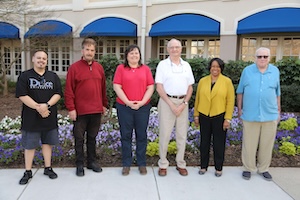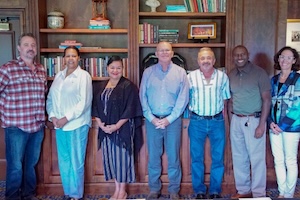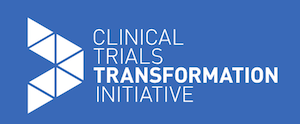All people – including patients, caregivers, community partners, and other stakeholders – bring value to clinical research and should be involved as partners in every stage of the research process.
Our Thinking
For too long people outside of the research world have not been embraced as full partners in the design and conduct of clinical research. The DCRI believes that all people – including patients, caregivers, community partners and other stakeholders – should be partners in research.
These stakeholders have the potential to impact every stage of the study life cycle, including design, funding, recruitment, protocol development, monitoring, data analysis, and FDA approval.
Our philosophy extends to the DCRI Research Together™ program which provides sponsors and investigators with access to DCRI thought leaders who understand the science of engagement.

Email DCRI-ResearchTogether@duke.edu or call 919-668-9210 to discuss your research needs and reach the appropriate engagement team.
In the videos below, DCRI Research Together™ experts explore how we are setting the gold standard by making a commitment to participant engagement.
Guiding Principles of Participant Engagement
Research Together™ means that relationships are bidirectional – everyone learns from each other and everyone gains value. The following principles guide these partnerships to ensure mutually beneficial outcomes:
- People come first. Always.
- We recognize that people are embedded in dynamic family and community frameworks that we honor and respect across the continuum of life care.
- People are our partners in research; not our subjects. We believe in taking every opportunity to co-learn. We engage participants, families, and community members in our research design, conduct, oversight, and dissemination activities.
- We are transparent and trustworthy. We communicate to research participants how valuable their contributions are to science and medicine. We take the time to thank research participants, update them on progress, and share our findings in language understandable to everyone
- We create value. We work to return results in a responsible and meaningful manner and maximize what can be learned by sharing data with other researchers. We give back.
- We are not transactional in our approach. We encourage and incentivize collaborations with people and communities that look past the end of a project or last study visit. We create opportunities to continue co-learning and working in partnership with participants, families, and community members to improve health outcomes.
Highlights

INCORPORATING PATIENT PERSPECTIVES TO CREATE VALUABLE RESEARCH
Schuyler Jones, MD, speaks with Greg Merritt and Nadine Zemon, two patient partners from the group called the Adaptors, about how their contributions to the ADAPTABLE trial have improved the study.

A SCIENTIFIC APPROACH TO THANKING PATIENTS
Groups across Duke and the DCRI are working together to develop lay summaries explaining study results and materials that thank patients for their participation in research. The study team will then assess how participants are affected by these materials.
Patient Partners

CONNECT-HF's Cardi-Yacks
The CONNECT-HF trial team worked closely with a team of patient advisers, called the Cardi-Yacks, while designing the trial. The Cardi-Yacks are all people living with heart failure, who offered their real-life experiences of living with heart failure to help researchers design a trial that would be both useful for patients and easy to participate in. The Cardi-Yacks gave feedback on the informed consent process, instructions and handouts for patients, patient resources, and more, all with the needs of real-life patients in mind.

AEGIS-II's Kardias
The Kardias are a diverse group of patient advisors from the U.S. and Canada who provide the patient perspective in the AEGIS-II study. AEGIS-II is a large research study on an experimental lipid treatment in participants who recently experienced a myocardial infarction. From the onset of the study, the group has helped increase understanding and ease around the consent process, educational needs, recruitment and retention strategies, and overall ways of enhancing the study participant experience.
Collaboration: The Clinical Trials Transformation Initiative (CTTI)

Situated within the DCRI, the Clinical Trials Transformation Initiative (CTTI), a public-private partnership co-founded by Duke University and the U.S. Food and Drug Administration, seeks to develop and drive adoption of practices that will increase the quality and efficiency of clinical trials.
CTTI’s membership now comprises more than 80 organizations from across the clinical trials enterprise, and it is this diverse representation of stakeholders that makes CTTI uniquely positioned to develop evidence-based solutions to clinical research challenges. Many regulatory agencies and organizations have applied CTTI’s nearly 20 existing recommendations, and associated resources, to make better clinical trials a reality. CTTI has created recommendations for enhancing participation and engagement of patient groups in medical product development.
DCRI Stakeholder Engagement Thought Leadership

Renee Leverty, BSN, MA
Renee Leverty, BSN, MA, serves as program lead for DCRI Stakeholder Engagement and oversees its Research Together program, which brings patients, caregivers, and community members together with sponsors and investigators to co-design research. By combining her unique experience as a patient advocate and social justice activist with 13 years of clinical trial project management for the Duke Clinical Research Institute, Leverty brings a deep understanding of the importance of creating systems and processes to support value-driven, patient-centered engagement models for clinical research.
Leverty has served as a project leader for a Patient-Powered Research Network (PPRN) funded by Patient Centered Outcome Research Institute (PCORI) and has broad experience engaging diverse pediatric, adult and aging populations, ranging from acutely to chronically ill in clinical trial design and conduct. She has led numerous patient advisory groups for industry-sponsored trials and NIH-funded studies, as well as community co-design sessions for comparative effectiveness research. Leverty works with sponsors and investigators to skillfully deploy patient perspectives across the clinical trial and translational continuum to achieve high quality, efficient research.
Leverty received her BSN from Minnesota State University, Mankato and her MA with a focus in medical ethics from Duke University.